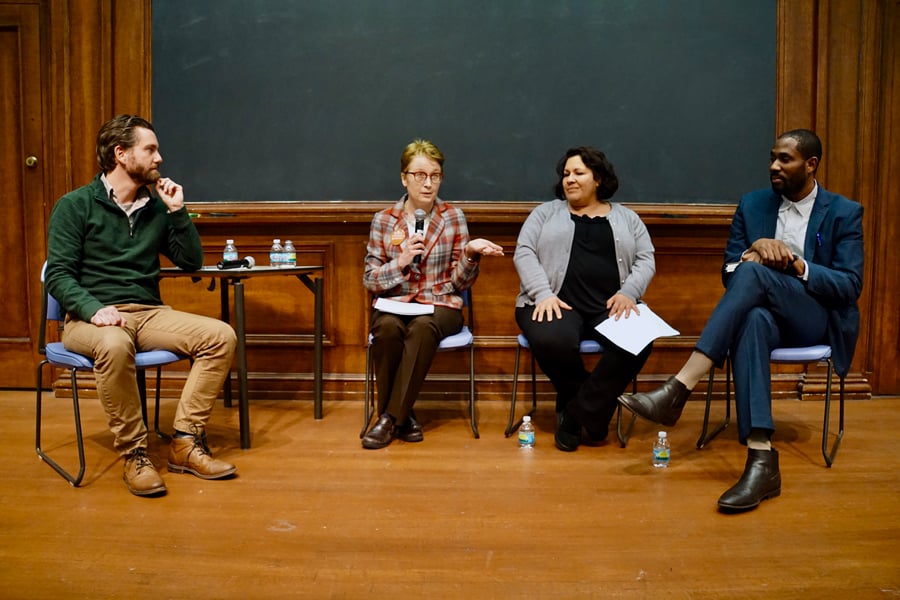Public health advocates discuss strategies for marginalized communities
Owen Stidman/The Daily Northwestern
Panelists at Thursday’s discussion on public health. Public health advocates discussed strategies for protecting marginalized communities.
January 23, 2020
Public health advocates discussed the merits of various approaches to preventing and controlling health concerns at a Thursday panel, focusing on strategies for supporting marginalized communities.
The panel was hosted by Community Health Corps and moderated by co-director of undergraduate global health studies Peter Locke. It featured Evanston Health and Human Services department director Ike Ogbo; Magdalena Nava, a senior project administrator at Chicago Cancer Health Equity Collaborative; and Skokie Health Department director Catherine Counard.
Speaking to a group of about 50 people in Harris Hall, Ogbo said Evanston’s Community Health Status Assessment, which compiles qualitative and quantitative data from residents on various health indicators, allows city officials to develop health priorities and solutions. Based on recent data, Evanston officials are working to address mental illness, obesity and violence, Ogbo said.
Still, Nava said data collection is often futile when health crises need to be immediately addressed, especially among marginalized communities.
“There’s so much data out there that has been analyzed and reanalyzed to come up with the same thing,” she said. “How many times do we have to keep on doing research and reanalyzing this data to say that people of color need health insurance? I understand why we need to collect data, but at what point do we stop and start taking action?”
Counard said Skokie’s community health plan, a five-year strategy to promote public health, isn’t a “sit-on-the-shelf document.” Some of the health plan’s objectives have materialized into action, she said.
One of the program goals asks health providers and community members to consider patients’ “adverse childhood experiences” when addressing individual and community health needs. Childhood abuse, violence and familial instability — which constitute adverse childhood experiences — may explain substance abuse addiction and overeating development later in life, she said.
To implement this goal, Counard said, Skokie’s health department is working with NorthShore University HealthSystem to ensure doctors consider these adverse experiences in a patient’s treatment.
Counard said the most important aspect of public health is community engagement.
“You can’t make any difference in the community if you don’t engage the community,” Counard said. “I don’t see how anyone could do this work without finding out what their needs are.”
Ogbo also said collaboration is key in creating robust public health programs. Evanston’s Health and Human Services department partners with social services organizations to survey “hard to reach” populations for the Community Health Status Assessment.
Immigrants, as well as people experiencing homelessness and mental illness, are often most likely to face public health challenges. But surveys often fail to account for these populations, Ogbo said. By working with social service organizations, he said officials can speak with representatives from these groups to determine which health issues they should prioritize.
Nava said ChicagoCHEC, which focuses on advancing equity in cancer health, employs “citizen scientists” to collect data in various communities. Because these people are often involved in the communities they engage with, she said they have an understanding of community dynamics and are better able to survey the population.
Nava added that public health priorities have shifted from curing diseases to preventing them. Donations and research often occur in trends. She said while domestic violence, HIV/AIDS and cardiovascular disease were once major priorities, officials are now focusing on preventing diabetes.
“It was AIDS and HIV,” she said. “That’s no longer a (major fundraising) thing, but we’re still dying from it. Then it’s cardiovascular disease. There’s not much money in there, but there’s still high blood pressure numbers in communities. We need to keep on focusing on all these illnesses to prevent them.”
SESP senior Juliana Conway and Weinberg senior Sally Shin, Community Health Corps co-directors, organized the panel.
Conway said she hopes the event encourages students to pursue careers in public health. She added that students should leave Evanston and interact with the Chicagoland community more often.
“Students at Northwestern can sometimes feel detached from the people who are living around them,” she said. It’s helpful to hear from leaders encouraging them to participate. Even if you’re just here for four years, there’s a lot more engagement that could happen.”
Email: [email protected]


